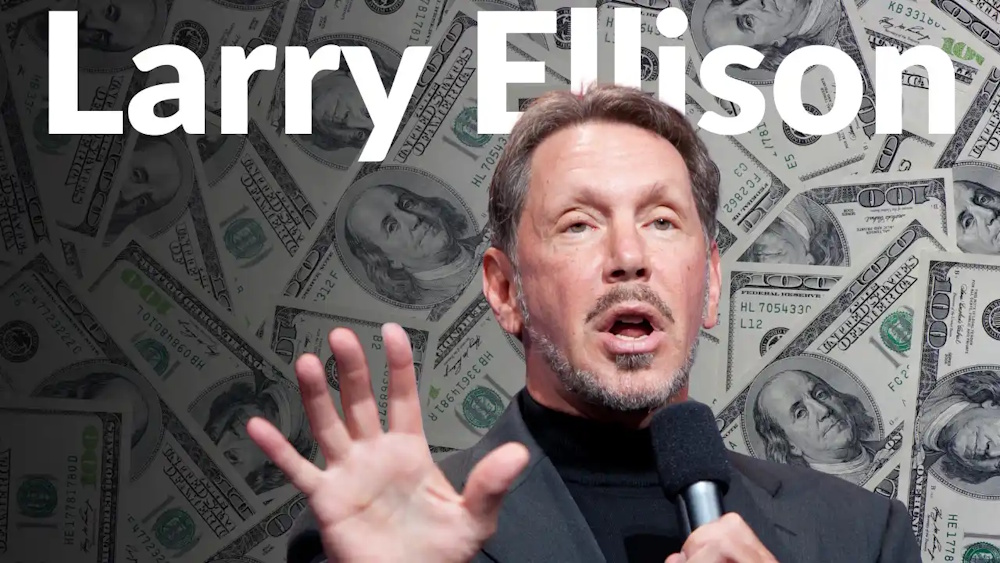
Larry Ellison momentarily held the title of the world’s richest individual on Wednesday, concluding the day just $1 billion behind the top spot. The uber-billionaire is still on the verge of becoming the world’s richest person, increasing his net worth by $88 billion Wednesday, momentarily displacing longtime title holder Elon Musk from his position.
The 81-year-old is Oracle’s largest individual shareholder, and the stock is experiencing its most significant single-day increase since 1992. Ellison’s wealth is reported to be $383 billion, just under Musk’s $384 billion. The origins date back to 1977, when Ellison, Bob Miner, and Ed Oates established Software Development Laboratories in Santa Clara, California. They were engaged by the CIA to develop a database program referred to as “Oracle.” Five years later, the company rebranded as Oracle and made its public debut in 1986. Over the past forty years, the company has experienced different degrees of success in technology, particularly highlighted by the recent surge in demand for its data center capacity from AI clients.
Ellison has occupied multiple leadership positions at Oracle, serving as president from 1978 to 1996. He served as chairman on two occasions, from 1990 to 1992. In 1992, he experienced a life-threatening bodysurfing accident. He returned in 1995 and stayed for nearly ten years. In 2014, Ellison transitioned from his role as Oracle CEO to become the executive chairman of the board and chief technology officer, positions he continues to occupy today. The company announced Tuesday that it signed four multibillion-dollar contracts with customers during the quarter and anticipates signing several more in the upcoming months, driving the stock — and Ellison’s wealth — to extraordinary heights. In 2012, Ellison acquired 98% of Lana’i, the sixth-largest island in Hawaii. A report indicates that his wealth at that time was $36 billion, and it was the same island where Bill and Melinda Gates tied the knot. He’s also quite the sailor. In 2013, Oracle Team USA, the team he supported, made a remarkable comeback to win and successfully defend the America’s Cup. The team was disbanded in 2017.
In 2018, Ellison co-founded SailGP, a high-speed catamaran racing league that competes globally and has garnered support from celebrity investors. Recently, actress Anne Hathaway, along with a group of investors, has taken ownership of the Italy SailGP team, while soccer star Kylian Mbappé has made an investment in the France SailGP team. He has also revitalized the Indian Wells tennis tournament in California, earning it the nickname of the “fifth slam.” It’s also renowned for featuring Nobu, an upscale sushi establishment, with views of one of its major show courts. Ellison has shown a keen interest in politics, often contributing millions to Republican and conservative organizations. In 2022, he contributed $15 million to a super PAC backing South Carolina Republican Sen. Tim Scott in his presidential campaign. In 2015, he made a contribution to Marco Rubio’s presidential campaign. Ellison currently maintains a strong relationship with President Donald Trump. In January, he joined OpenAI CEO Sam Altman and SoftBank CEO Masayoshi Son at the White House as Trump revealed the establishment of a new company aimed at enhancing AI infrastructure in the United States. Ellison has also contributed to medical initiatives. In 2016, he announced a $200 million donation to the University of Southern California to establish a cancer research and treatment center.
In 2010, he committed to the Giving Pledge, an initiative supported by Bill Gates that ensures at least 95% of one’s wealth is donated to charitable causes. Ellison recently announced that he was “amending” that effort, directing some of the funds toward a technical institute he established in collaboration with the University of Oxford. The Ellison Institute of Technology’s “humane endeavors include transforming healthcare by designing and distributing a new generation of life-saving drugs, combating world hunger by engineering higher yielding crops and building a global network of low-cost indoor growing systems, and slowing climate change by developing efficient clean energy generation and storage systems,” he wrote.
